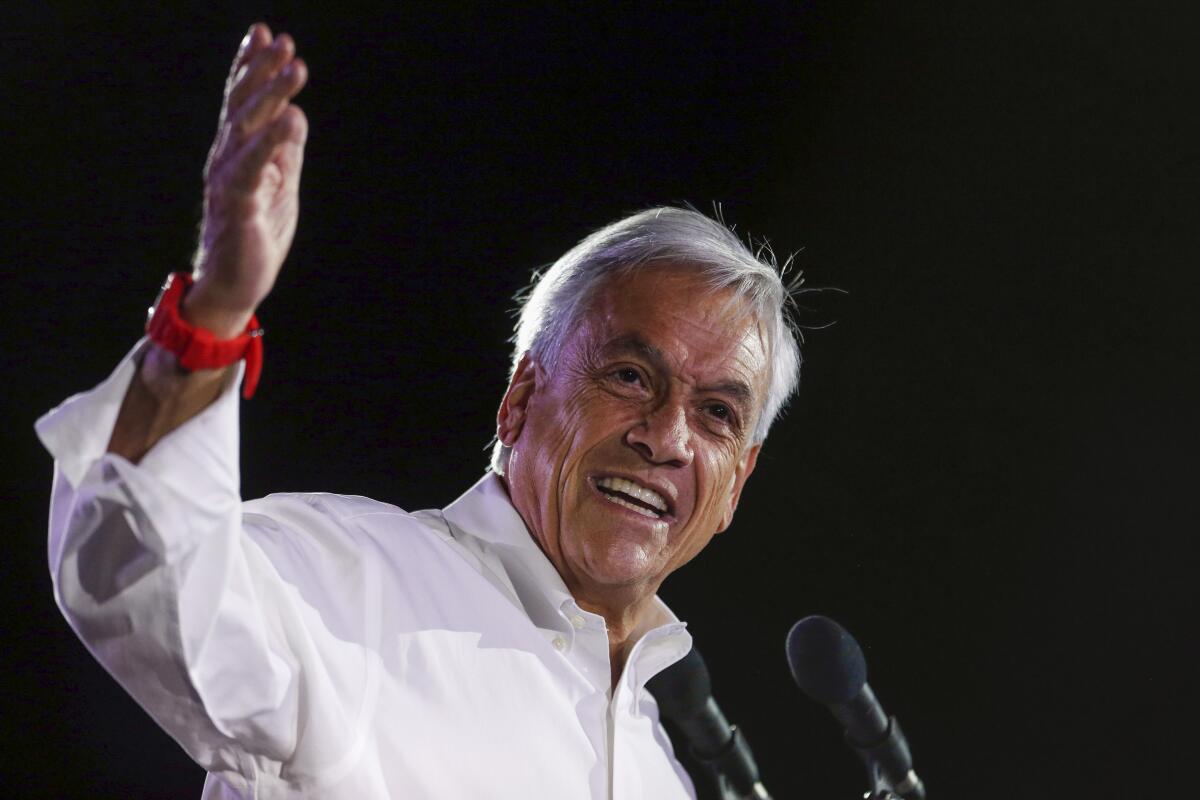Former Chilean President Sebastián Piñera dies in a helicopter crash

VIÑA DEL MAR, Chile — Sebastián Piñera, the two-time former president of Chile who faced social upheaval followed by a pandemic in his second term, died Tuesday in a helicopter crash. He was 74.
Chilean Interior Minister Carolina Tohá confirmed the death of the former president. No further details were immediately released about the cause of the crash.
Serving as president from 2010 to 2014 and again from 2018 to 2022, he led the South American nation during devastating natural disasters, including an earthquake and a tsunami.
He also governed during the COVID-19 pandemic and placed Chile among the top five countries for vaccination rates for the illness.
His legacy is marred by violent police repression in October 2019 against protesters who were demonstrating against the country’s education, health and pension systems dating to the country’s 1973-1990 military dictatorship. International organizations cited mass violations of human rights in the crackdown.
The social unrest ultimately led to two attempts to update the constitution inherited from the military government, but both failed.
Piñera’s death came as Chile was recovering from deadly wildfires in the county’s central region.
Chilean President Gabriel Boric honored Piñera in a speech Tuesday afternoon as a leader “seeking the best for his country,” highlighting his management of the pandemic and other emergencies. “He was a democrat from the very first moment,” Boric said.
The death also drew an outpouring of condolences from leaders and former leaders across Latin America from both the left and right.
Brazilian President Luiz Inácio Lula da Silva wrote on the social media platform X that it was sad that Piñera had died so “abruptly.”
“We worked to strengthen the relationship between our countries and we always had a good dialogue when we were both presidents, and also when we weren’t,” he said.
Argentine President Javier Milei sent condolences, as did his predecessor, Cristina Fernández de Kirchner.
“As everyone knows, we did not have the same ideas, but we were always united by a relationship of great respect: he was a right-wing man but deeply democratic,” Fernández said. “I remember with affection his sense of humor and the warmth of his family, whom I met in Chile.”
Piñera held the fifth-largest fortune in Chile, estimated at $3 billion. He worked as an academic at several universities for almost 20 years and as a consultant for the Inter-American Development Bank and the World Bank.
As a businessman in the 1970s through the 1990s, he worked in a variety of industries, including real estate. He held shares in major airlines, telecommunication, real estate and electricity companies. He also created one of the largest credit card companies in the country. In 2009, he handed over the management of his businesses to others.
He entered politics representing the center-right, which was the civilian support of the military regime. However, when he served as an independent senator, he voted against extending the presidency of dictator Augusto Pinochet, who ruled from 1973 to 1990.
Piñera ran three times for president. In 2006, he lost to Michelle Bachelet; four years later he defeated former President Eduardo Frei. Then, in 2018, he began a second four-year term after defeating the candidate from Bachelet’s coalition.
Twelve days before the beginning of his first term, an 8.8 magnitude earthquake and a tsunami claimed the lives of 525 people and devastated the infrastructure of south-central Chile.
Piñera’s government agenda was postponed to take on emergency reconstruction. Also in 2010, he oversaw the rescue of 33 miners trapped for 69 days at the bottom of a collapsed mine in the northern Atacama Desert.
The rescue and the adverse conditions the miners survived captured the world’s attention. One of Piñera’s last social media posts commemorated their rescue.
“It was a song to life that inspired the world and showed the best of the Chileans’ mettle and the soul of our nation,” he wrote.
More to Read
Sign up for Essential California
The most important California stories and recommendations in your inbox every morning.
You may occasionally receive promotional content from the Los Angeles Times.









